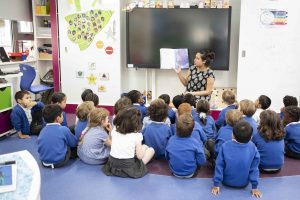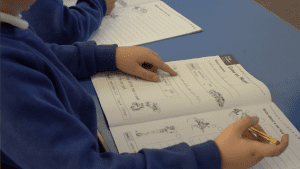

Ruth’s blogs

FRED’S PAL – Ofsted acronym
Ruth Miskin introduces the Fred’s Pal as a sharp, memorable checklist of what inspectors look for in quality phonics and early reading instruction.

Don’t take the ‘write’ out of Read Write Inc. Phonics
Read Write Inc. Phonics was created to teach reading and writing together, where every reading activity supports the next, every writing activity builds upon the one before, and mastering handwriting, spelling and composing flows naturally from phonics lessons. Keep the ‘write’ firmly in Read Write Inc. Phonics.

Headteachers who book Development Days are ahead of the game
Ruth Miskin praises headteachers who prioritise termly Read Write Inc. Development Days, bringing in expert trainers to coach reading leaders, refresh staff skills, review pupil progress, and embed the latest phonics best practice, ensuring their schools stay ahead and every child makes rapid reading progress.

Guest Blog: Speech sounds – when to be concerned
Speech development is a complex journey. While minor omissions and mispronunciations are part of the process, persistent difficulty articulating multiple age-expected sounds may warrant a hearing test or referral to speech and language therapy

Show parents what Reception children can do
Give parents a front-row seat to Reception learning—weekly assemblies where children read aloud, play Fred Talk, and share new sounds, inspiring families to join the phonics journey at home.

Don’t confuse grouping with setting
Ruth Miskin explains that grouping children by incremental phonics stages, not by age, is the key to keeping everyone confident: it lets teachers teach at the right level, spot who’s ready to move on, and support those who need it, so no child is ever left behind.

Wired to thrive on repetition
Young children are wired to thrive on repetition—they beg for their favourite stories and poems. The more you read it, the more they love it. They copy your emphases, silly voices, crazy actions. You won’t have to beg them to read at home, they’ll beg to borrow the book.

‘Again, again!’ Why reading to your child every day is a predictor of later reading comprehension
Reading the same story to your child every day isn’t just comforting—it’s a powerful predictor of their future reading success. By making books a daily ritual, you’re building their vocabulary, comprehension, and love of reading.

Recycle your carpets – 6 good reasons to disband ‘carpet’ areas in Key Stage 2
By Year 3, it’s time to rethink carpet time: it can promote poor discussion, disrupt teaching, limit writing opportunities, waste time, and contribute to poor posture.
